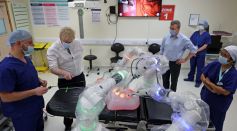MEDICINE & HEALTH

7 Science-Backed Health Benefits of Smiling

Self-Estimating BMI, Body Size Associated With Obesity, Other Health Conditions

Curtailed Sleep, Physical Activity, and Cardiovascular Health Link Revealed; How Does Intense Exercise Stress the Heart?

Laparoscopic Surgery by Robotic Arm Successful; Operation Made Autonomous Through Machine-Learning Technology

Changes in Blood Vessels in the Retina Linked to Risk of Heart Disease, Study Suggests

Heartburn Causes: Why Does the Chest Feel Like It's on Fire After Eating and What Foods Can Help Ease the Feeling?

First-Ever Frog Limb Regrowth Found Effective; Serves as Stepping Stone for Regenerative Medicine

Heart Transplant Denied to 31-Year-Old Patient Who Refused to Receive COVID-19 Vaccine

What is Omicron Subvariant BA.2? Scientists Now Closely Monitoring the More Contagious Virus

Obesity, Kidney Disease More Likely to Occur in People with Type 1 Diabetes

Culture Influences How People Evaluate Creativity, Study Says

Immersive Virtual Shopping A Potential Solution to Cognitive Assessment, Study Says

People Who Drink Red Wine May Have Lower Risk of COVID-19 Infection

Changes in Heart Size Could Affect Memory and Thinking Abilities in Middle Age, Study Suggests
Most Popular

NASA Reveals an Astronaut Was Medically Evacuated From the ISS for the First Time After a Non-Emergency Health Scare

How the Immune System Fights Diseases: Antibodies, Vaccines & Lasting Protection

Sun Reaches Solar Maximum: What the Intensifying 11-Year Solar Cycle Means for Earth

Why Biodiversity Matters More Than We Think: How Species, Ecosystems, and Conservation Shape Our Planet





